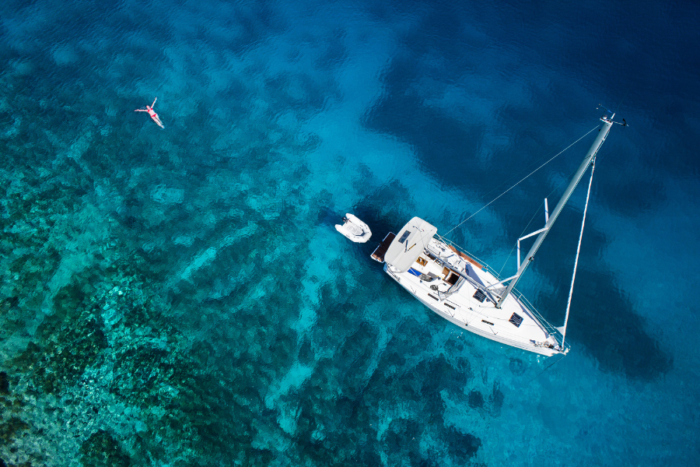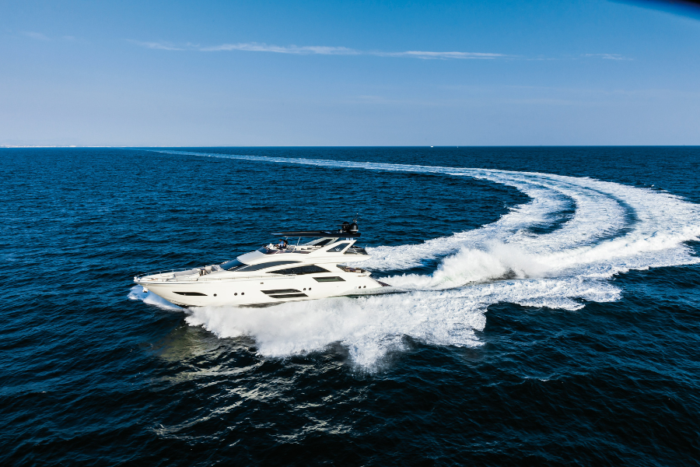The Ultimate Guide to Luxury Yacht Ownership
March 11, 2025
Luxury yacht ownership isn’t just about boats – it’s about access.
It’s a ticket to a world few will ever experience, where the open sea becomes your playground and exclusive destinations may lie beyond the horizon but are firmly within your grasp.
But the dream only becomes a reality if you get to grips with the costs, benefits and, most importantly, the yacht registration process.
Choosing the right jurisdiction isn’t a bureaucratic necessity; it’s the key to unlocking greater mobility, legal advantage and financial freedom.
In short, think of it as a very exclusive passport.
The Nomad Capitalist team has weighed anchor and sailed the seven seas to put together this in-depth guide to how smart financial planning, a clear understanding of the perks and a strategic registration approach can transform yacht ownership from a luxury into a powerful asset.
The Benefits of Luxury Yacht Ownership
Yacht ownership requires a clear-headed assessment of the practicalities, but let’s not forget the compelling reasons why individuals choose to embark on this journey.

Unrivalled Freedom and Privacy
The allure of the open ocean is undeniable, but for the high-net-worth individual, a yacht’s true value lies in the unparalleled freedom and privacy it affords.
A yacht becomes, in essence, a floating sovereign territory, subject to the laws of its chosen flag state and enjoying notable jurisdictional perks.
Exclusive Access to the World’s Most Desirable Destinations
While a private jet can whisk you to a five-star resort, a yacht gives you a different dimension of travel.
Picture having the ability to curate a bespoke itinerary, exploring hidden coves, cruising to marinas with limited public access and discovering unspoiled corners of the world that remain blissfully off the typical tourist radar.
For the global citizen, this freedom of exploration can also present unique opportunities – perhaps even stumbling upon a previously unconsidered haven for residency or investment.
Either way, there’s a certain satisfaction in bypassing the airport queues and having spacious accommodation wherever you go.
Bespoke Luxury Customisation
Another notable benefit of luxury yacht ownership is that you’re not stuck with some off-the-rack, one-size-fits-all product. You have the opportunity to curate a living space perfectly suited to your personal preferences and lifestyle.
You can configure the vessel to meet your specific needs, whether that means installing a state-of-the-art office for remote work – because even paradise requires the occasional Zoom call – creating dedicated zones for family fun or outfitting the yacht for expeditions to far-flung corners of the globe.
Meet Like-Minded Individuals
The world of luxury yachting is filled with a community of people who share a passion for exploration, adventure and the finer things in life. It’s less about formal networking events (thankfully) and more about the organic connections that arise from shared experiences.
Investment Potential and Appreciation
While not every yacht appreciates like a classic car, a well-chosen and meticulously maintained vessel can be a surprisingly sound investment. Factors like brand reputation, strategic customisation and consistent upkeep contribute to value retention.
Furthermore, the potential for charter income can offset operational costs, turning a luxury asset into a revenue stream.
Leave a Legacy for the Next Generation
Yacht ownership can help you share your love of exploration, global perspective, and cherished values with future generations. It’s about sharing a lifestyle, creating a sense of adventure, and making a legacy of experiences beyond money.

The Cost of Owning a Luxury Yacht
Luxury yacht ownership demands a substantial financial commitment.
A detailed review of the entire cost structure beyond the initial purchase is absolutely vital for responsible ownership and maintaining a degree of solvency.
Initial Yacht Purchase Price
The price tag for a luxury yacht can range from ‘substantial’ to ‘astronomical’, depending on whether you’re looking at a pre-owned vessel or a brand-new, custom-built behemoth.
Expect figures to range from a few million dollars for a smaller, older yacht to tens or even hundreds of millions for a superyacht with all the bells and whistles.
Crew Salaries and Management Fees
Unlike your average family car, a yacht requires a professional crew to operate and maintain, and their salaries add up to a considerable ongoing expense.
Depending on the size of the yacht and the number of crew required, annual costs can range from several hundred thousand dollars to well over a million.
Dockage and Mooring Fees
Securing a berth for your yacht, particularly in popular marinas and during peak season, can be surprisingly costly.
For example, a 50-metre yacht berthed in a high-end marina like Porto Cervo in Sardinia or Monaco during peak season could incur daily fees of several thousand dollars, potentially exceeding US$250,000 annually.
Conversely, opting for a less ‘fashionable’, though equally delightful, location such as Croatia or Turkey could reduce those costs by 50% or more.
Maintenance and Repair Costs
A luxury yacht, much like a high-performance sports car, requires regular and meticulous maintenance – and occasional, unplanned repairs. These costs are ongoing and can be somewhat unpredictable.
A general guideline is to budget for annual maintenance expenses equivalent to 5% to 10% of the yacht’s value.
Luxury Yacht Insurance
Protecting your valuable floating asset with comprehensive insurance is imperative to cover a potential mishap.
Premiums are influenced by factors such as the yacht’s value, its intended cruising area (pirate-infested waters cost extra, naturally), and the crew’s experience.
Expect to pay an annual premium ranging from 0.5% to 1.5% of the yacht’s value.
Luxury Yacht Fuel Costs
Fuel consumption is another noteworthy expense, particularly for larger yachts and those undertaking long voyages.
Costs fluctuate depending on global fuel prices, the size and efficiency of the yacht’s engines and, of course, how enthusiastically one applies the throttle.
A trans-Atlantic crossing, for example, can easily result in a fuel bill running into tens of thousands of dollars.
Luxury Yacht Financing Options
Financing options are available for those who prefer not to liquidate a small island nation to acquire their yacht.
Marine mortgages and lease arrangements can help spread the cost, although it’s a good idea to seek professional advice. After all, we’re talking about borrowing sums that could make your average mortgage lender blanch.
Yacht Ownership Tax Implications
Tax rules for yacht ownership are complex and change based on where you live, the yacht’s flag state and your cruising areas.
That’s not to mention the fact that you’ll be cruising between tax jurisdictions, which may impact your personal tax obligations.
Seeking expert tax advice is not just recommended – it’s practically mandatory. While careful structuring may offer potential tax advantages, this is definitely not a do-it-yourself area.

Yacht Registration and Flag Choice
Aside from buying your yacht, registering your vessel is the next most important step, as it determines the legal rulebook your vessel needs to follow.
This impacts everything from taxes to where you can sail without raising eyebrows (or, worse, incurring fines). Choosing the ‘right’ flag is a key part of that decision.
Importance of Flag Selection
The flag state, the country under whose laws the yacht is registered, dictates the regulatory environment in which the vessel operates.
Selecting a flag state with a stable legal framework, a strong reputation and favourable tax policies will better protect your investment and ensure smooth sailing, both literally and figuratively.
Step-by-Step Yacht Registration Process
While the process and steps vary from state to state, the registration process typically involves these key steps:
- Confirm your yacht meets the specific requirements of your chosen flag state (age, size, construction standards).
- Assemble all the necessary paperwork, including proof of ownership, builder’s certificate and previous registration documents (if applicable).
- Many registries require or recommend appointing a local representative or agent.
- Complete and submit the registration application, along with all required documents and fees.
- Arrange for any necessary surveys or inspections to verify the yacht’s condition and compliance.
- Once approved, receive the yacht’s Certificate of Registry, which acts as its official ‘passport’.
Types of Registries
Yacht registries vary significantly in their requirements and procedures.
Some are restricted to citizens or residents of the flag state (‘closed’ registries), while others are open to international owners (‘open’ registries or ‘flags of convenience’). There are also ‘hybrid’ registries that offer a blend of perks.
The best choice depends on your specific situation and preferences.
A yacht owner who values the prestige and international recognition associated with a particular flag might choose a traditional national registry, even if it requires a closer connection to that country.
On the other hand, a yacht owner planning extensive world cruising might choose a registry with fewer restrictions on crew nationality and operating areas, even if it entails slightly higher registration fees.
There’s no best or worst option here. Rather, you need to understand exactly how you’ll be using your yacht and what areas you want to optimise when choosing a flag.
Top Flag State Options
Several jurisdictions are frequently chosen for yacht registration, each due to a particular combination of benefits – and, of course, varying degrees of bureaucratic charm.
The Marshall Islands, Cayman Islands, Malta and the Isle of Man are some of the most popular jurisdictions.
These places are valued for their easy registration procedures, solid legal systems and friendly tax policies that don’t induce immediate despair.
VAT and Tax Minimisation
Handling value-added tax (VAT) regulations is another often complex aspect of yacht ownership, particularly within the European Union.
The applicable VAT rate and any potential exemptions or deferments depend on factors such as the yacht’s intended use (private or commercial), its cruising area and the owner’s residency status.
Strategic planning, guided by expert tax advice, can significantly – and legally – minimise VAT liabilities. One wrong move, however, could be costly.
Ownership Structures
The legal ownership structure of a yacht has significant implications for liability, taxation and confidentiality.
Many owners opt for corporate structures, such as limited companies or offshore entities, to hold title to the yacht.
These structures can offer advantages in terms of asset protection, tax efficiency and an easier transfer of ownership, but they also add a layer of legal and administrative complexity.
Ultimate Yacht Buying Guide: FAQs
Feadship, Lürssen, Amels, Oceanco and Heesen consistently rank among the top luxury yacht builders. They are widely respected for their quality, craftsmanship, customisation options and strong resale values.
A yacht management company handles the operational aspects of yacht ownership, such as crew management, maintenance, accounting, regulatory compliance and charter management.
Fraser Yachts, Burgess, Camper & Nicholsons, Y.CO and Northrop & Johnson are leading yacht management companies.
Start browsing online – check out major yacht brokerage websites and magazines. This gives you a feel for what’s out there, prices and current trends, helping you narrow down what you want and can afford before talking to a broker. Once you have an idea of what you want and can afford, look for a broker that deals within your range.
Fractional ownership and co-ownership programs offer shared purchase and operating costs. This grants access to a yacht for a set period annually, reducing the individual financial burden.
Select a flag state with a strong maritime reputation, political and economic stability and a tax regime that aligns with your financial goals. Our guide to yacht registration reveals everything you need to know.
The most significant considerations before buying a superyacht are the level of luxury and size range. Amenities that will enhance your experience will also influence your choice of yacht. Many arrange a charter or sea trial, allowing them to fully appraise the yacht’s features before buying.
The price of a yacht can range significantly from US$300,000 to US$4 billion and depends on luxury level, size and age. The maintenance cost of ownership is, on average, 10% of the overall value.
Maintaining a super yacht costs between 10% and 20% of its purchase price annually, not including staff salaries and fuel. Expenses include dockage fees, insurance, crew salaries, repairs and upgrades.
Yes, owning a yacht or charter business can be profitable, especially in high-demand locations like the Mediterranean or Caribbean. Profitability depends on various factors, including location, competition, yacht size and type, condition and age, charter rates and operating costs.
When people quote the 10% rule, they refer to the theory that annual running costs will be around 10% of a yacht’s purchase price.
Don’t Set Sail Unprepared
This guide has covered a lot of ground, from the high costs of fuel to the nuances of selecting the right flag state.
But here’s another crucial but often overlooked factor: many of the challenges faced by new yacht owners stem not from the yacht itself but from an insufficient understanding of the legal and tax implications before buying.
Don’t let this happen to you.
Let us help you map out your global citizenship and offshore tax strategy before you even sign a brokerage agreement.
We specialise in creating bespoke strategies for high-net-worth individuals seeking true financial and personal freedom. Book a no-obligation consultation with Nomad Capitalist to see how we can make your life as a yacht owner plain sailing.



Does Puerto Rico Pay Taxes to the US?
It’s a common question and one that often fuels confusion, debate, and a fair share of misinformation – Do residents of Puerto Rico actually pay US federal taxes? When most people think of US tax obligations, they naturally assume they apply uniformly across all US citizens. But when it comes to Puerto Rico, things are […]
Read more

Zug Canton Taxes: The Ultimate Destination for Wealth Management in Switzerland
Switzerland’s global reputation is built not just on stunning views of Alpine peaks and serene lakes but also on a foundation of exceptional quality of life, world-class infrastructure and investor-friendly tax policies. The results speak for themselves: efficient public transport seamlessly links cities and villages; the standard of living regularly ranks among the highest in […]
Read more

How Smart Investors Use Venture Capital to Build Wealth
Big companies like Google, Amazon, Facebook and Apple all started out as bold ideas backed by venture capital. Decades later, the same firms are household names, as familiar to most people as electricity, the internet, or the telephone. But hindsight is a fickle friend. The truth is, it wasn’t always so obvious they’d succeed. These […]
Read more




